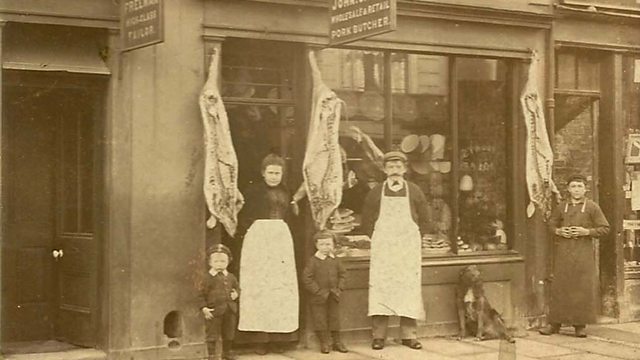Sneinton, Nottingham: Attack on German Butchers
When German sounding names and streets were Anglicised
In May 1915, a week after the Germans torpedoed and sunk the British ocean liner, RMS Lusitania – with a huge loss of life – Nottingham experienced its worst anti-German disturbances of the war.
Seven local shops were attacked, as crowds targeted stores thought to be German owned. In one incident in Sneinton, the police estimated that more than a thousand people gathered outside a butchers shop to shout insults and throw stones.
There are no reports of anyone being seriously injured in the attacks and they weren’t on the same scale as the riots in Liverpool, but some of the shops sustained smashed windows and days later a few people were brought to court. Three were fined for throwing stones at the butchers owned by the Wagners and two teenagers were fined for attacking Hoffmans butchers on Sneinton Street.
The Nottingham Evening News reported that Hoffman denied having any German connections and he later changed his name to Mason.
Only about a hundred Germans lived in Nottingham at the time, of which half were of military age and had to report daily to the Guildhall.
After the disturbances in May the troubles weren’t repeated and records show that all the store owners continued trading for the remainder of the war.
Anti-German sentiment didn't disappear though. In 1917, the authorities decided to alter any street names with Germanic origins, including three in Mapperley; Coburg Road became Corby Road, Mecklenburg became Malvern and Hamburg became Hampstead.
Location: Sneinton, Nottingham NG1 1DR
Image: Butchers shop in Nottingham (circa, 19th Century), courtesy of Nottingham City Council
Duration:
This clip is from
Featured in...
![]()
91�ȱ� Radio Nottingham—World War One At 91�ȱ�
Places around Nottingham that tell a story of World War One
More clips from World War One At 91�ȱ�
-
![]()
The loss of HMY Iolaire
Duration: 18:52
-
![]()
Scotland, Slamannan and the Argylls
Duration: 07:55
-
![]()
Scotland Museum of Edinburgh mourning dress
Duration: 06:17
-
![]()
Scotland Montrose 'GI Brides'
Duration: 06:41







